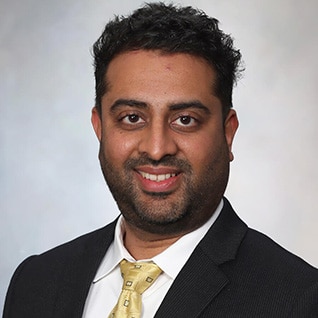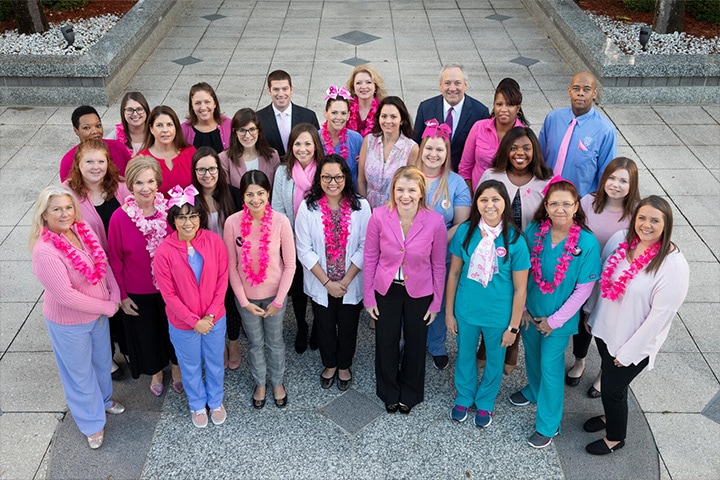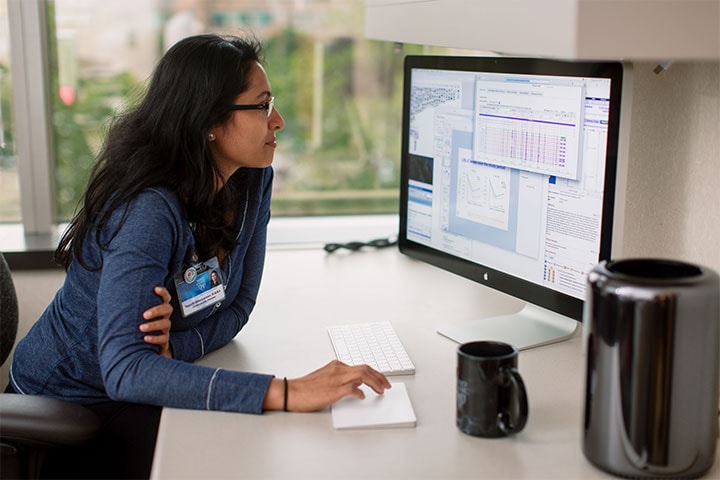Overview
The one-year Endourology and Minimally Invasive Urological Surgery Fellowship (Florida) will allow trainees the opportunity to perform advanced robotics oncology coupled with training in holmium laser enucleation. Fellows will graduate confidently having mastered robotic prostatectomy (multi-port/single-port), robotic partial nephrectomy, robotic cystectomy, robotic reconstruction, and holmium laser enucleation of the prostate.
Unique program highlights include:
- Six to seven two-month, mentor-based rotations will be set up with core faculty practicing the domains previously listed. Each core faculty member is an expert surgeon in their field.
- Research and travel are highly encouraged. Fellows are granted trips based on research completed during their fellowship year. Attendance at AUA and WCET are expected.
- Approximately one-half of each week is afforded for research endeavors.
Accreditation, certification, program history
Accreditation
The program fulfills the training requirements as defined by the American Board of Urology and is accredited by the Society of Endourology.
The Endourology and Minimally Invasive Urologic Surgery Fellowship is accredited through the Endourological Society for an advanced clinical training certificate for combined endourology and laparoscopic/robotic surgery.
Certification
A one-year Advanced Clinical Training Certificate is awarded by the Endourological Society at completion of the program.
Program history
The Urology Department at Mayo Clinic began in 1986. The Endourology and Minimally-Invasive Urologic Surgery Fellowship program at Mayo Clinic in Florida will have its first fellow in 2027.
Application process
Positions
One new fellow is available each year.
This highly competitive fellowship offers exposure to single-port and multi-port robotic oncology, specializing in prostate and kidney cancer. Moreover, the fellow will rotate with a surgeon specializing in Holmium laser enucleation of the prostate. The fellow should easily target the following number of cases/case types: 60+ RALP, 40+ RAPN/Nx, 10+ RCx, 5+ Focal Tx, 10+ robotic reconstruction, and 40+ HoLEP. We are looking for applicants who want a wide exposure to minimally invasive surgery — both benign and malignant.
Qualifications
Applicants for the one-year Endourology and Minimally Invasive Urological Surgery (Florida) fellowship program must have completed an ACGME-accredited five- or six-year program.
To be eligible for the Endourology and Minimally Invasive Urological Surgery Fellowship in Florida, you must expect to complete a residency program in urology and be eligible for a Florida medical license.
This includes qualified candidates from outside the United States and Canada who meet the following criteria:
- Have graduated from an international medical school recognized by the World Directory of Medical Schools
- Meet all Visa sponsorship requirements
- Are certified by the Educational Commission for Foreign Medical Graduates (ECFMG)
- Are eligible for Florida medical license, which requires a minimum of one year of accredited residency or fellowship training in the United States or Canada.
Also see general admissions requirements.
How to apply
Applications to the Endourology and Minimally Invasive Urological Surgery Fellowship (Florida) are accepted from November through mid-March. The academic year begins July 1.
- All applicants to the fellowship must register with the Endourological Society (ES).
- Submit a completed ES Fellowship Application.
- Applications must include the following supporting documentation:
- Curriculum vitae and bibliography
- Personal statement of professional goals
- Valid ECFMG certificate, if applicable
- Three original letters of recommendation from physicians or faculty members who are thoroughly familiar with your work; one of these should be from your residency program director
- Applicants who eventually match to the Endourology and Minimally Invasive Urological Surgery Fellowship (Florida) will be required to submit to the Mayo Clinic School of Graduate Medical Education the following documentation as a requirement for appointment:
- Copy of diploma from your medical school
- Dean's letter sent directly from your medical school to the education coordinator of the Endourology and Minimally Invasive Urological Surgery Fellowship
- Official final medical school grade transcript indicating degree earned and date conferred (provide certified or notarized English translations of documents originally written in a language other than English)
- Official test transcripts for all applicable examinations: USMLE, LMCC, COMPLEX, NBOME, FMGEMS, FLEX or NBME
- Copy of your completion certificate from each of your prior residency and/or fellowship training programs.
- Interviews are conducted in the spring of each year prior to the appointment year and are offered to the applicants deemed most competitive.
The academic year begins July 1. Appointments are made by Mayo Clinic School of Graduate Medical Education based on results from the Endourological Society Fellowship Match, which is sponsored by the American Urological Association.
mentor-based rotations with faculty
hours/month of protected research time (approximately)
Curriculum
Clinical training
You participate in all aspects of patient care and function independently in surgical cases. You are adequately supervised at all times for surgical cases and are primarily responsible for perioperative management of all surgical and hospitalized patients.
The fellow should easily target the following number of cases/case types: 60+ RALP, 40+ RAPN/Nx, 10+ RCx, 5+ Focal Tx, 10+ robotic reconstruction, and 40+ HoLEP. We are looking for applicants who want a wide exposure to minimally invasive surgery – both benign and malignant.
Rotation schedule
| Rotation | Length |
|---|---|
| Prostate cancer: multi-port RALP, single-port TV/EP RALP, focal therapy (Cryoablation/TULSA), TP biopsy | 4 months |
| Reconstruction and minimally-invasive oncology: Robotic pyeloplasty, robotic ureteral re-implant, robotic prostatectomy/nephroureterectomy | 2 months |
| BPH: HoLEP | 2 months |
| Bladder cancer/oncology: robotic cystectomy, TURBT | 2 months |
| Kidney cancer: robotic partial nephrectomy/nephrectomy | 2 months |
Didactic training and conferences
Didactic training
You will participate in departmental conferences, journal clubs, and training events throughout the academic year.
Conferences
You will attend bi-weekly Tumor Board Conference. You will attend Monday Morning Grand Rounds hosted by the Department of Urology as well as participate in the monthly Morbidity and Mortality Conference. You will attend the monthly topic-oriented Journal Club in the Department of Urology.
Research and teaching opportunities
Research opportunities
Fellows can engage faculty members on specific research projects. Fellows are expected to submit abstracts to WCET/AUA/NARUS/SURS meetings. Mayo Clinic Department of Statistics can provide all bio-statistics support. Mayo Clinic Office of Clinical Trials can provide a framework for trial build.
Teaching opportunities
You meet periodically with your mentor and the program director to discuss individual goals and future career plans.
If you have an interest in education, an opportunity to present didactic lectures to residents is provided.
Call frequency
Fellows are expected to take faculty call at a frequency no more than 1:11.
Evaluation
To ensure that you acquire adequate knowledge and develop the appropriate technical skills to meet program expectations, your performance is monitored carefully during the program. You are evaluated formally by the supervising faculty member after each clinical rotation, and you will meet with the program director to review these evaluations. In addition, you will also regularly evaluate the faculty to ensure that your educational needs are being met.
Facilities and locations
Fellows will have one clinic and one hospital setting — Mayo Clinic in Jacksonville, Florida.
Belonging
At Mayo Clinic, we foster an inclusive working environment and embrace the diversity of all our trainees, faculty, staff, and patients. Our Office of Belonging offers tremendous resources to support our mission of maintaining a welcoming atmosphere for all our employees, including our learners. We strive to provide culturally appropriate care and do our part to reduce healthcare disparities.
/0x0:512x512/prod01/channel_2/media/studio-sites/mccms-reference-guide/512X5121573348_3801872_0024-(1).jpg)
Video: See yourself at Mayo Clinic
5:33
From the program director
Welcome to the Endourology and Minimally Invasive Urological Surgery Fellowship (Florida) at Mayo Clinic in Florida! We appreciate your interest in our program. A fellow in our program has the opportunity to work with several world-class surgeons and academicians. We offer depth and breadth in all of the sub-disciplines in minimally invasive urologic surgery.
Training in the Department of Urology at Mayo Clinic is based on a mentorship model. The fellow spends approximately eight continuous weeks with a designated mentor. The operations and clinical work are specific to one attending surgeon’s practice. The fellow is offered the opportunity to learn and practice the finest details of a given surgery (e.g. robotic partial nephrectomy, robotic prostatectomy, HoLEP) in a focused, dedicated experience. Graduating fellows are confident and accomplished as they embark on their own surgical practices.
The mentorship model also allows the fellow to learn how an individual surgeon runs a busy, well-rounded practice — including administrative duties, operating schedule, clinical responsibilities, research activities, and work-life balance.
Fellows in our department have access to robust databases, including those for prostate cancer, focal therapy, single-port robotics and more. The fellow has the opportunity to be as productive as is desired.
The aim of the Endourology and Minimally Invasive Urological Surgery Fellowship (Florida) at Mayo Clinic is to provide the fellow with the resources to successfully launch a prosperous career. We are very proud of our program, our department, and our city. We look forward to the opportunity to share our experience with those looking to refine their surgical, clinical, and academic expertise.
Ram Pathak, M.D.
Program Director
Endourology and Minimally Invasive Urological Surgery Fellowship
Department and faculty
Department
The Department of Urology at Mayo Clinic is committed to excellence in patient care, education, and research. We are a very busy surgical department. Fellows are expected to hit the following case target minimums:
- 60+ Robotic prostatectomy (MP/SP)
- 40+ Robotic partial/radical nephrectomy
- 10+ Radical cystectomy
- 5+ Focal therapy (TULSA/cryotherapy)
- 10+ Robotic reconstruction (pyeloplasty/reimplant)
- 40+ Holmium laser enucleation of the prostate
Faculty
The program is unique in that you get dedicated time with the faculty members who have diverse backgrounds and clinical foci, such as:
- Robotic prostatectomy – both multi-port and single-port
- Holmium laser enucleation of the prostate
- Robotic kidney and bladder surgery
- Image-guided therapy for urologic cancers (i.e. ablation, focal therapy)
Wellness initiatives
As a trainee, your physical and mental health are priorities to Mayo Clinic and the department. Trainees have access to several resources to promote well-being, as well as time off clinical duties to attend appointments.
- Fitness centers
- Groups on campus
- Well-being
Fitness centers
 Mayo Clinic residents or fellows can experience 24/7 free access to the Bill Hewitt Employee Wellness Center — opened in the summer of 2024 and spans 6,700 square feet with modern cardio machines, weight machines, free weights, a studio for live classes, and includes showers and locker rooms for convenience.
Mayo Clinic residents or fellows can experience 24/7 free access to the Bill Hewitt Employee Wellness Center — opened in the summer of 2024 and spans 6,700 square feet with modern cardio machines, weight machines, free weights, a studio for live classes, and includes showers and locker rooms for convenience.
Additionally, residents or fellows at our three campuses get discounted membership fees to area gyms. In Jacksonville, Florida, residents and fellows can obtain an exclusive discount with the YMCA (several locations).
Groups on campus

Opportunities to join a variety of groups on campus provide regular social activities and can help enhance your training while connecting with a broad group of peers.
Trainees will have the opportunity to join a Mayo Employee Resource Group (MERG) at any time during their training program. Mayo Employee Resource Groups (MERGs) are employee-led affinity groups to promote belonging, increase cultural awareness, and foster an environment of respect and inclusivity. Any Mayo Clinic employee can join a group of interest and choose their level of involvement
Well-being
 The Office of Academic Support and Well-Being provides resources to promote academic, emotional, social, cognitive, financial, and physical well-being. Career and academic services include academic advising, peer tutoring, and accommodations for learners with disabilities or health conditions. Mental health services, counseling, interview practice, and a variety of enrichment sessions on topics like budgeting, resiliency, and stress and burn-out are also available through the Academic Support and Well-Being office.
The Office of Academic Support and Well-Being provides resources to promote academic, emotional, social, cognitive, financial, and physical well-being. Career and academic services include academic advising, peer tutoring, and accommodations for learners with disabilities or health conditions. Mental health services, counseling, interview practice, and a variety of enrichment sessions on topics like budgeting, resiliency, and stress and burn-out are also available through the Academic Support and Well-Being office.
More from Mayo Clinic School of Graduate Medical Education
/0x0:512x512/prod01/channel_2/media/mccms/content-assets/academics/residencies-and-fellowships/3319834_0363-512X512.jpg)
Choosing Mayo Clinic
/0x0:512x512/prod01/channel_2/media/mccms/content-assets/shared-documents/campus-FL-Jax_Davis_Bldg_Mar2003_R-pic-tile.jpg)
Jacksonville, FL
Campus and community
/0x0:512x512/prod01/channel_2/media/studio-sites/mccms-reference-guide/512X5121676671_3824027_0010_C.jpg)
Stipend and benefits
/360x0:1080x720/prod01/channel_2/media/mccms/content-assets/academics/residencies-and-fellowships/endourology-and-mius-fellowship-fl/1440X720_Endo-MIUS-robotic-surgery-WF3303414_0125.jpg)
/0x0:440x220/prod01/channel_2/media/mccms/content-assets/campus-amp-community/florida/440X220_sidebar-mayo-clinic-jacksonville-fl-shu244045420.jpg)